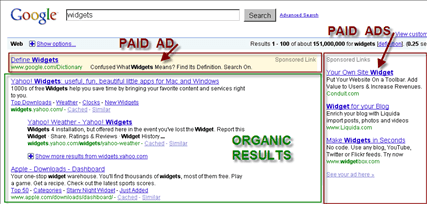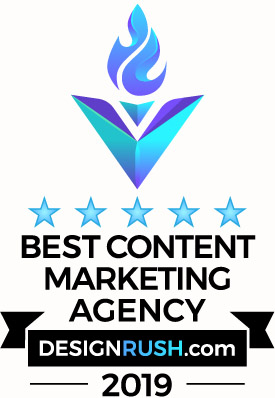In part 1 of this series, Website Traffic and Search Engines, I revealed that recent estimates were that 14 billion searches are conducted each day.
I also explained that it doesn’t take a rocket scientist to understand that the higher up within the results that a site is placed, the more likely it is to get some of that traffic. I ended part one with the statement that search engine marketing is used to improve a website’s (or blog‘s) position in the search rankings.
In this post, I’ll discuss search engine marketing and its potential for building website traffic.
Paid Search, Organic Search and Search Engine Marketing
Search results pages include both paid ads and “organic” or “natural” search results. Here’s an example of a Google search results page:

Therefore, the practice of search engine marketing includes both:
- Paid search advertising
- Organic search engine optimization (SEO)
Either (or both) of these elements of search marketing can be used to get your site at the top of the search results. And the following rule of thumb is true for both:
The higher the position within the search results, the greater the likelihood of getting a click.
Having both a paid and an organic listing at the top of the search results can further increase the likelihood of a click – both on the ad and on the organic result. Think of it as positive reinforcement.
- The primary goal of search engine marketing is to get the site’s pages (or ads) to appear as high up within the first few pages of search results, through organic SEO, PPC or a combination of both.
- The primary goal of the search engines is to return the sites they consider most relevant to the keywords used. In the case of paid search, an additional advantage is given to the highest bidder.
Search engines do not inherently rank websites: they rank web pages. Otherwise, every search result would point to a site’s home page. Therefore, each page that ends up in the search results becomes a point of entry to your website.
The greater the number of pages listed in the organic search results, the more available points of entry and the greater the traffic potential.
Search Engine Marketing and Paid Advertising – PPC
With pay-per-click (PPC) advertising, outbidding your competitors on keywords and having landing pages and ads that are highly relevant to those keywords will get your site on the first page of the search results.
- PPC allows you to start and stop displaying your ads whenever you like. Once you pause or stop a PPC campaign, your pages drop completely out of the paid area of the search results pages.
- Using PPC is an excellent, if not somewhat expensive, way to get your site to the first page of the search results.
Paid search is an excellent way for newer websites to appear within the first pages of search results until they begin ranking well within the organic results.
Search Engine Marketing and Organic Search
Getting your site on the first page of the organic results takes more time and effort. To do so, your site needs to be considered among the most relevant sites for the keywords used in a search. That’s where your content, the age of your site and the search engine optimization (SEO) aspect of search marketing come into play.
Unlike paid search, the SEO aspect of search marketing has no on-off switch:
- Engaging in SEO activities will not get your site on the first page of results overnight.
- Likewise, stopping SEO activities will not get your site removed from the search results overnight.
- When search engines change their minds on what’s important for strong organic rankings, they won’t tell you. With paid search, they’ll usually give you tips on how to improve the positioning of your ads. In many cases, they’ll provide suggestions throughout your campaign.
But what is SEO, what’s involved and how can it improve website traffic?
Next up: Part 3 in this series – Website Traffic and SEO
Have you used search engine marketing to boost your website or blog’s traffic? Did you use SEO, PPC or both and what kind of results did you see?








Website traffic and SEO has a relation. I believe this one. I am not clear about PPC. If you have any details guideline on PPC, please share me. Waiting for your response.
Studies have shown that having both a paid ad and an organic search result on the same page can increase the click through rate for both. Since one of the signals that a site is relevant to a specific search is the click-through rate on the organic listing, it would make sense. Not a requirement, but good to know.